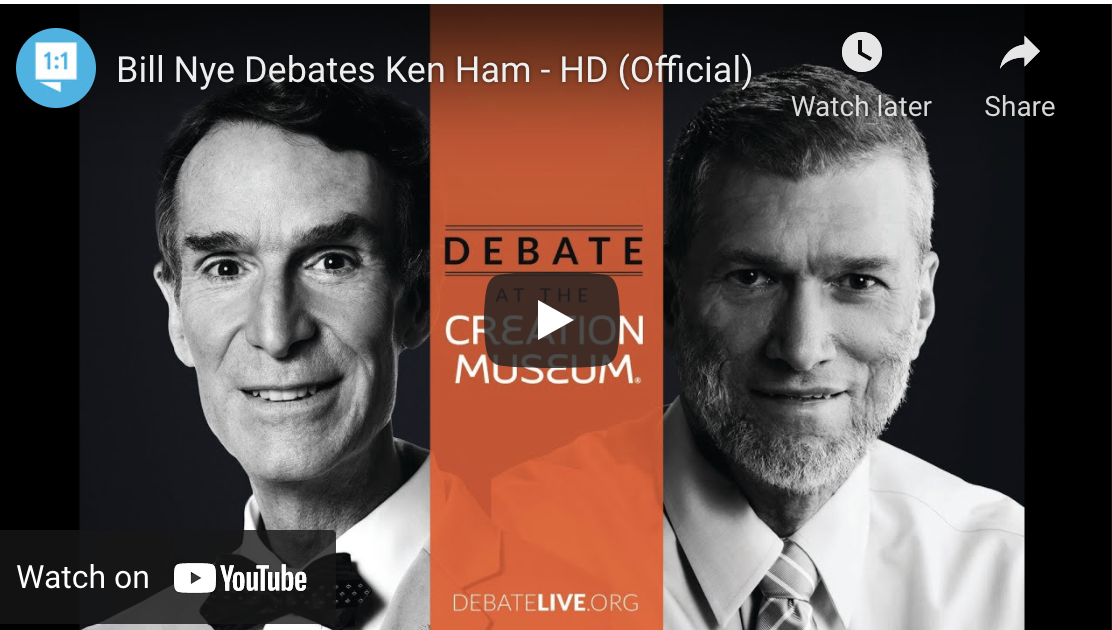
Gravitational Attraction
What would happen if two people out in space a few meters apart, abandoned by their spacecraft, decided to wait until gravity pulled them together? My initial thought was that …

Seems as if everyone is talking about the recent Ken Ham vs Bill Nye debate on evolution and creation, so I figured I'd put in my two cents.
I couldn't help but notice the use of the word "proof" in this debate especially by Ken Ham. After reading my post about proof, can one really maintain that my distinction between "proof" and "evidence" is "splitting hairs", as one commenter put it? Said another way, when Ken Ham says "You can't prove the world is 5 billion years old, you weren't there", is this not obviously a word-game?
The debate was not as bad as I thought it would be. Ken Ham did not do a Gish Gallop, much to my relief. I think it may encourage other scientists to deal with this problem of creationism, although I do recognize the strength in the argument that "debates" on topics that are not in debate in the scientific community can give credence to the pseudoscience.
I have no experience in debate, so take my criticisms with a grain of salt, especially given that I think Nye did quite a good job. I thought it was great that Nye used CSI to point out there is no difference between Ham's so-called "observational science" and "historical science". I think he could have gone a lot further and pointed out that parallel at every point. For example, what if one of the investigators brought out a 100 year old book that claimed that the butler did it? What would the other investigators say, and why? What if the first investigator said that he was starting with the position that the 100 year old book was absolutely true, and that nothing could sway him from that position? Placed in a more familiar setting, Ken Ham's position is seen to be ridiculous. Essentially we have a difference of methodology that needs to be highlighted, and one could use CSI examples to really accentuate that difference.
To bring out the nature of evidence in assessing claims, even in the past, and lay bare this distinction that Ham likes between observational and historical one can simply explore the question (in an entertaining way, as only Nye can do) which forms the basis for all of scientific thought:
You have two people claiming different things, how do we distinguish between what is true and what is not?
When Ham kept saying "You can't prove the world is 5 billion years old, you weren't there", I would have first reminded everyone of the distinction between evidence and proof. More importantly I would also point out that the entire premise of shows like CSI is that the investigators were not there and yet can establish to a high confidence what happened! Essentially, using Ham's argument, every CSI episode would have to end "you can't know, you weren't there!"
Although I'm a bit more partial to Columbo, it is the case in all of these sorts of shows that different hypotheses about "who done it" lead to different conclusions. Often they point in the same direction on some observations, like the two hypotheses "the butler did it" and the "the cook did it" are consistent with the observation that the victim seemed to know the person attacking them. But they also predict different possible observations, such as footprints, or tracks left in the hall. Ham claimed that the global flood could lay down fossil beds. Nye countered with "why did no mammal happen to sink down to the level of the dinosaurs (of the same size?", and "why do we see no evidence of kangaroos between the Middle East and Australia?". These are exactly right, and one can drive this home again and again. Pointing out the cherry-picking of the creationist is essential!
Ham made a big deal about the assumptions of radiometric dating. A quick comment about how one can establish the confidence in these methods by calibrating with known processes (e.g. tree rings, sediment layering) would have been nice. When this is done, it is amazing that all of these independent processes lead to the same estimates of age, within the uncertainties. The creationist would have us believe that this is just a coincidence!
Finally, there were I think two statements by Ham that I found refreshing. He flatly admitted that he was starting with Biblical inerrancy, and working from there. He also flatly admitted that no evidence would sway him from that position. Those two statements really do lay the creationist agenda bare.